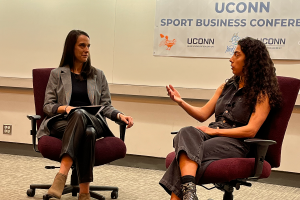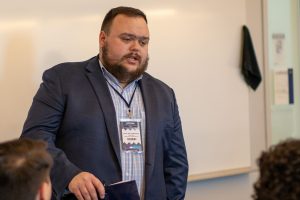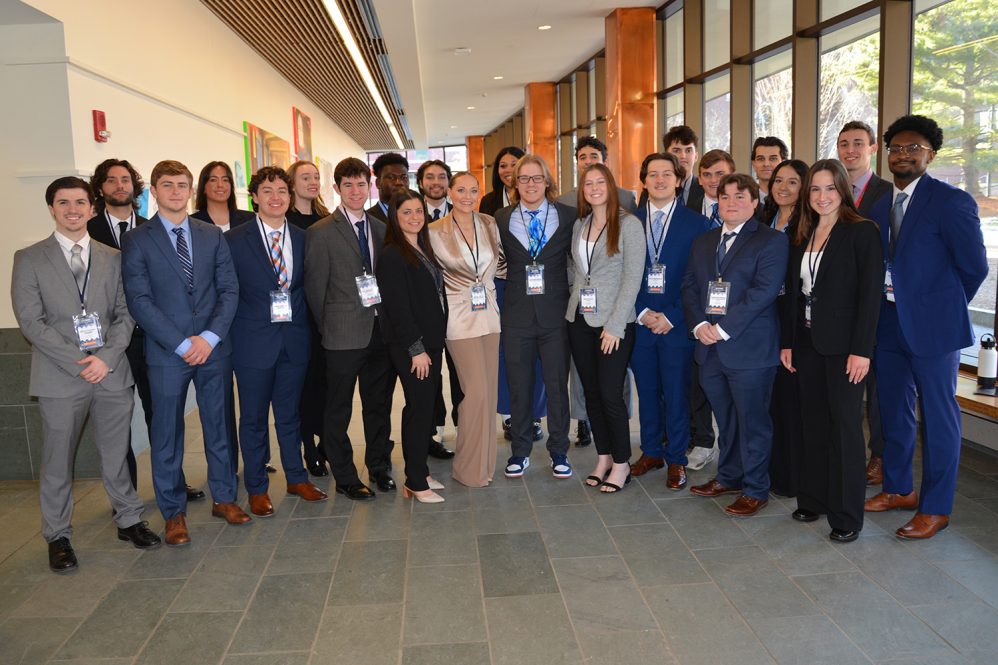Last month, the UConn Neag School of Education’s sport management program hosted the eighth-annual Sport Business Conference (SBC) in Laurel Hall at UConn Storrs. The student-run event focuses on providing a professional opportunity to engage with experts in the sports industry across diverse career paths through a daylong event that includes speakers, panels, breakout sessions, and networking opportunities.
The morning of Feb. 25 started with keynote speaker Faith Celeste McCarthy ’17 (ED), ’18 MS, an associate manager of business operations with ESPN. McCarthy was interviewed in a Q&A session by Neag School faculty member Danielle DeRosa, who also advises the SBC.
DeRosa began by describing McCarthy’s accolades, including the Donald Kinsman Award, a high honor within UConn Athletics given annually to one female and one male student who demonstrate universal success during their time at UConn.

McCarthy also shared with the audience her experience as a former student-athlete at UConn and how she first connected with the sport management program. “I met with Dr. Laura Burton; she just sold me on being in sport management, and it was an absolute blessing,” McCarthy recalled.
After finishing her undergraduate degree in sport management, McCarthy discussed continuing with the master’s program, squeezing two years of classes into nine months. Now, six years later, she has built a successful career at ESPN, where she manages business operations, strategy, and experiential for sports business development and innovation.
McCarthy described attending an espnW event, “Campus Conversation,” when she was a student at UConn, unknowingly laying the groundwork for her future.
“It was in that lecture hall, right across the way,” she recalled. She would graduate and land a job with espnW, working with the division, traveling the country, and empowering female athletes. “It’s cool to give back and be on the other side of that event.”
As she immersed herself in her role at ESPN, she recognized the value of inclusivity: “It wasn’t about checking boxes; it was about creating a culture where every voice mattered, and diversity was celebrated,” she said.
The significance of inclusivity and diversity in driving organizational success was a key theme of McCarthy’s keynote speech. She emphasized creating spaces where diverse perspectives are valued and heard.
As the discussion drew to a close, McCarthy imparted valuable advice to the students: “Sometimes the right question is better than the right answer.” Drawing from her own experiences, McCarthy encouraged them to embrace uncertainty and approach challenges with an open mind.
“This is a fantastic opportunity for our sport management program alumni to engage with current students,” DeRosa said later on. “They have the opportunity to give back in a way that’s impactful and tangible.”
The History of SBC
The SBC was established in 2016 to connect students with opportunities in the sports industry. Originating from a group of passionate sport management students, the conference aimed to bridge academia with industry, offering practical experiences and connections.
Each year, the conference has expanded its offerings, attracting professionals from diverse sports industry sectors. Notable speakers from organizations like the Celtics, Patriots, ESPN, and NBC Sports have shared insights and experiences over the years. The SBC emphasizes hands-on experiences, introducing new additions like broadcasting panels and professional organization recruiting tables. Low student-to-speaker ratio ensures meaningful interactions and networking opportunities.
“For students, the conference provided a platform to explore various career paths within sports through workshops and mentorship sessions,” said SBC Chief Operating Officer Chloe Boule ’24 (ED). “It equipped them with professional development and networking skills for their future careers.”
For students, the conference provided a platform to explore various career paths within sports through workshops and mentorship sessions. It equipped them with professional development and networking skills for their future careers. — Chloe Boule '24 (ED)
“Behind the scenes, student planners gained valuable event management experience, shaping the conference’s direction and impact,” Boule said. “The conference’s inclusive nature, focusing on diversity, equity, and inclusion initiatives, fostered a welcoming environment.”
“I decided to get involved with SBC because it seemed like a great opportunity to build friendships, connections, and professional experience when I started three years ago,” said SBC Chief Executive Officer Dale Erickson ’24 (ED). “It was an opportunity to funnel my passion for sports in a way that can be showcased to students, professors, and professionals. The experience and knowledge that I have gained through this position have helped elevate my understanding of the business of sport, which is also what I want to pursue for jobs in the future.”
As the conference has grown over the years, it has become a crucial event for students, often leading to internships and job opportunities. Its impact extends across the University, attracting attendees from various disciplines.
“The event is important because it helps the students to expand their understanding of the sport industry,” DeRosa says. “Sport management is a highly practical field, so offering the opportunity to speak to alumni and professionals within the sport industry allows our students to see a path for themselves, which I believe is very powerful.”
Conference Founder Comes Full Circle

UConn’s director of men’s basketball operations, Paul Wettemann ’18 (ED) ’20 MS, was part of the initial group of ambitious students who hatched a plan that would forever change the landscape of their academic community.
“Back in my freshman year of college at UConn, a group of friends and I were all involved with the Sport Business Association, and we had been hearing about premier sport business conferences around the northeast,” he said.
UConn needed such an event. Armed with passion and a desire to enhance their peers’ professional development, they set out to organize the inaugural UConn Sport Business Conference. From keynote speakers to workshops and networking sessions, the students meticulously planned every detail to provide attendees with a transformative experience.
They welcomed 130 students that inaugural year. Years have passed, but the spirit of the SBC has endured. As an alumnus, Wettemann returns as a speaker and student mentor. For him, it is a full-circle moment — a chance to give back to the program that shaped his career and fostered lifelong friendships.
“It wasn’t just an event; it was a testament to the program’s unrivaled resources and the boundless potential of its students,” he said. “Some of the best young professionals in the industry are starting at this event. No other schools in the Northeast are putting on an annual event like this with the level of success they are having here at UConn.”
To learn more about the Neag School of Education’s sport management program, visit sport.education.uconn.edu.



